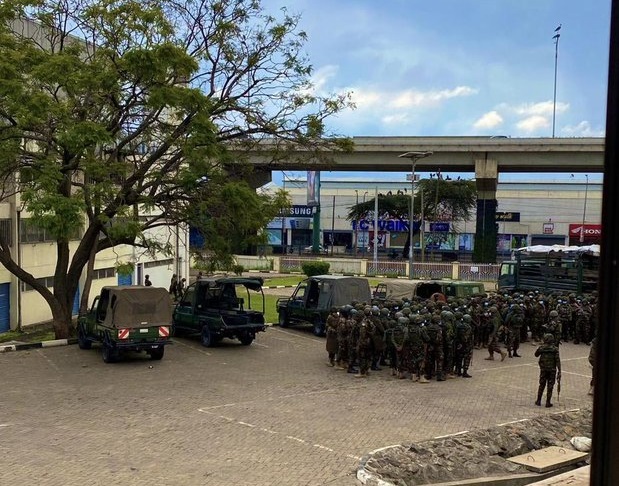High Court Judge Lawrence Mugambi has retreated to examine whether the deployment of the Kenya defence forces was lawful and justified.
The court will deliver a ruling at 3 pm on whether it will issue orders stopping the deployment of military officers in regards to the gazette notice.
During the hearing of the case filed by the Law Society of Kenya, the Judge posed several questions to the parties present as he sought to understand aspects of military operations and laws specific to defence forces.
He asked the LSK to comment on instances when KDF may be deployed to which the society cited article 241 of the constitution.
“There are two situations when KDF can be deployed. One instance is when there’s there’s an emergency or disaster and the other situation is when there’s unrest,” LSK President Faith Odhiambo said.
Article 241(b) in which Duales gazette notice is hinged indicates that the defence forces shall assist and cooperate with other authorities in situations of emergency or disaster, and report to the National Assembly whenever deployed in such circumstances.
241(c)on the other hand states that the defence forces may be deployed to restore peace in any part of Kenya affected by unrest or instability only with the approval of the National Assembly.
Based on this, LSK told Justice Mugambi that there’s no information from the state on whether the presence of the military in the capital city is meant to deal with an emergency or to deal with unrest or instability.
“You have not been told anywhere there’s been unrest,” said LSK.
“In this case, what happened was that CS Duale issued the gazette notice before approval was sought. That was in breach of the constitution and should be stopped.”
The notice they said was supposed to be issued within 24 hours after approval had been made by parliament.
But the approval according to LSK was sought when KDF had already been deployed.
On its part, the state is defending its move saying there is nothing illegal in the gazette notice issued by CS Aden Duale.
The Attorney General and other state parties as represented by Emmanuel Bitta said the action by the CS was above board in respect to the timelines as the notice was issued within 24 hours.
Bitta said a decision needed to be made before that decision was subjected to an approval process.
He urged the court not to grant the orders sought.
“In current circumstances, you haven’t been told what will happen if orders are issued. Lsk can’t authoritatively comment on the issue of security,” he said
“If we endanger the lives of citizens in this country. What’s the remedy? Will order protect the right to life and property or not?” he posed
As he submitted this, the judge asked, “Why do you think Parliament must grant approvals or a report be made to Parliament when it comes to deployment of military and not other service?”
“It’s a supervisory mechanism. These are polycentric issues,” Bitta responded.
However, the LSK insisted that Parliament’s permission was only sought after deployment.
“Any powers exercised must be within parameters of the constitution. There should have been certain procedures and should have been followed before the notice was issued,” LSK said.


















